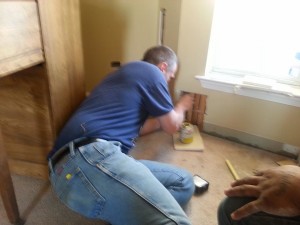 Frozen water pipes create huge problems for homeowners. When outdoor temperatures drop below freezing, the water pipes inside your home can easily freeze. Freezing water expands. This expansion causes the pressure inside the pipes to increase, leading to bursting water pipes in your home. During the cold winter months, you are probably not going to experience any problems because these now broken pipes will most likely remain frozen. However, when Spring hits, these broken water pipes will thaw as temperatures warm. That’s when these leaks cause huge problems. These leaks can be extremely hard to find, but they have to be found to keep water from spoiling your home. This creates an expense that you need to avoid.
Frozen water pipes create huge problems for homeowners. When outdoor temperatures drop below freezing, the water pipes inside your home can easily freeze. Freezing water expands. This expansion causes the pressure inside the pipes to increase, leading to bursting water pipes in your home. During the cold winter months, you are probably not going to experience any problems because these now broken pipes will most likely remain frozen. However, when Spring hits, these broken water pipes will thaw as temperatures warm. That’s when these leaks cause huge problems. These leaks can be extremely hard to find, but they have to be found to keep water from spoiling your home. This creates an expense that you need to avoid.
High winds add to the problem. As we write this article, we are expecting a significant snow and wind blizzard in the DC and Maryland area tomorrow through Sunday. When these freezing winds, expecting to gust up to 55 miles per hour, hit your home, they threaten your inside water pipes. Pipes that run against exterior walls that have little or no insulation are most vulnerable to freezing. There are ways to prevent frozen water pipes. We want to give you some quick and easy tips to use throughout these winter months.
Here are some tips to help prevent frozen water pipes:
- Ensure that critical areas are adequately heated. Every home is different and their location is different. Based on forecasts, it seems that these freezing winds will come from the Northeast. You may or may not know exactly where your home sits and how this may impact you. With high winds come drifts. If the drifting snow is piling up in the front of your house, ensure that the front of your house is adequately heated. That should be your primary focus during a storm or major cold weather event.
- Maximize the heat you’re already generating. Here’s an example. Let’s say you are using your oven to bake or cook your dinner. Your oven generates excess local heat in your kitchen. If you have water pipes in your kitchen, as most people do, open your cabinet doors to allow this excess heat to warm your pipes.
- Keep the temperature in your home consistent. A lot of homeowners moderate or control their heating system depending on whether they are home, not at home or in bed under cozy and warm covers. You may pay a little more in energy costs, but certainly a lot less if you have frozen water pipes eventually streaming unwanted water into your home. Keep the temperature set at the same levels during these events. You may even want to overheat your home by a few degrees.
- Use space heaters to heat your most vulnerable areas. Grant it, you are not going to run to Walmart to purchase portable heaters. Most homeowners in our area have already done their shopping and have prepared their families for this blizzard. However, if you have some portable heaters, use them to protect the most vulnerable areas in your home.
Proper insulation in select areas of your home can help prevent a costly unwanted expense associated with frozen water pipes. But, the purpose of this article is simply to provide some quick tips to help you during this impending blizzard and upcoming winter months. If you need help or advice, we are here for you; just give us a call for more information.


